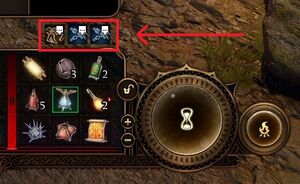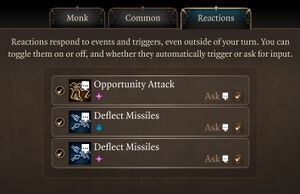Actions: Difference between revisions
No edit summary |
m (Reverted edits by 87.127.129.50 (talk) to last revision by Willowisp) Tag: Rollback |
||
| (18 intermediate revisions by 5 users not shown) | |||
| Line 1: | Line 1: | ||
{{PageSeo | {{PageSeo | ||
| title = Actions | | title = Actions | ||
| description = Actions are things a creature can do on their turn in Baldur's Gate 3. | | description = Actions are things a creature can do on their turn in Baldur's Gate 3, usually by expending available resources. | ||
}} | }} | ||
{{ | {{Redirect | ||
'''Actions''' are | | redirect = Action | ||
| use1 = the resource | |||
| article1 = Resources#Action | |||
| custom1 = Resources | |||
}} | |||
'''Actions''' are the acts taken by [[creatures|creatures]] on their turns in ''Baldur's Gate 3''. Actions are generally taken in order to deal [[damage]] or inflict harmful [[Conditions|conditions]], but they can also be taken to [[healing|heal]] or aid allies. | |||
A special form of action – known as a '''reaction''' – can be used as a response to certain triggers, including on the turns of {{em|other}} creatures. | A special form of action – known as a '''reaction''' – can be used as a response to certain triggers, including on the turns of {{em|other}} creatures. | ||
| Line 18: | Line 23: | ||
Actions are categorised by their source: | Actions are categorised by their source: | ||
; Common actions : Common actions are actions available to all creatures. | ; Common actions : Common actions are actions available to all creatures. | ||
; Class actions : Class actions are actions available through [[features]], such as those gained from [[classes]] or [[equipment]]. | ; Class actions : Class actions are actions available through [[features]], such as those gained from [[classes]] or [[equipment]]. Many actions taken by [[Non-player characters|NPCs]] are also considered class actions. | ||
; Racial actions : Racial actions are actions available through racial features, and are exclusively gained from [[race]]. | ; Racial actions : Racial actions are actions available through racial features, and are exclusively gained from [[race]]. | ||
; Weapon actions : [[Weapon actions]] are actions available through equipping [[weapons]]. | ; Weapon actions : [[Weapon actions]] are actions available through equipping [[weapons]]. | ||
| Line 24: | Line 29: | ||
; Situational actions : Situational actions unlock as a result of another ability, feature, or condition. It remains at the side of the character's hotbar until the conditions creating it expire. One such example is [[Forced Manoeuvre]] as a result of [[Manoeuvring Attack (Melee)]]. | ; Situational actions : Situational actions unlock as a result of another ability, feature, or condition. It remains at the side of the character's hotbar until the conditions creating it expire. One such example is [[Forced Manoeuvre]] as a result of [[Manoeuvring Attack (Melee)]]. | ||
== Resources == | |||
Creatures take actions in [[turn-based mode]] by expending one of two [[resources]]: {{SmallIcon|Action Icon.png}} Action or {{SmallIcon|Bonus Action Icon.png}} Bonus action. | Creatures take actions in [[turn-based mode]] by expending one of two [[resources]]: {{SmallIcon|Action Icon.png}} Action or {{SmallIcon|Bonus Action Icon.png}} Bonus action. | ||
| Line 33: | Line 38: | ||
All creatures have 1 charge of each of the three resources that recharges at the beginning of each turn, but additional charges can be gained from [[Sources of additional actions|various sources]]. | All creatures have 1 charge of each of the three resources that recharges at the beginning of each turn, but additional charges can be gained from [[Sources of additional actions|various sources]]. | ||
=== Exceptions === | |||
; Additional actions : Actions that allow a creature to take an {{em|additional}} action per turn – such as {{SAI|Action Surge}} – {{em|do not}} consume the resource they provide. | ; Additional actions : Actions that allow a creature to take an {{em|additional}} action per turn – such as {{SAI|Action Surge}} – {{em|do not}} consume the resource they provide. | ||
; Free attacks : | ; Free attacks : Classes that have the {{SAI|Extra Attack}} feature can take an additional free Attack action on their turn after taking an Attack action, without expending an {{SmallIcon|Action Icon.png}} Action resource. | ||
== Reactions == | == Reactions == | ||
| Line 41: | Line 46: | ||
Reactions are actions taken in response to a trigger, and can be taken even if triggered on another creature's turn. | Reactions are actions taken in response to a trigger, and can be taken even if triggered on another creature's turn. | ||
Some reactions require the acting creature to expend a {{SmallIcon|Reaction Icon.png}}, whereas other reactions do not. Those that do not are generally class features which use the reaction mechanic, such as {{SAI|Divine Smite}}, {{SAI|Sneak Attack}} or {{SAI|Reckless Attack}}.{{note| | Some reactions require the acting creature to expend a {{SmallIcon|Reaction Icon.png}}, whereas other reactions do not. Those that do not are generally class features which use the reaction mechanic, such as {{SAI|Divine Smite}}, {{SAI|Sneak Attack}} or {{SAI|Reckless Attack}}.{{note| Many class features which are implemented as reactions in ''Baldur's Gate 3'' are not reactions in the tabletop RPG which ''Baldur's Gate 3'' is based on. Reactions were added to the game fairly late in development, which may the cause of this change.}} | ||
=== The Reactions tab === | === The Reactions tab === | ||
| Line 57: | Line 62: | ||
=== Examples of reactions === | === Examples of reactions === | ||
=== Spells ==== | ==== Spells ==== | ||
{ | {{div col | style = column-width: 18em; list-style-type: none;}} | ||
* {{SAI|Hellish Rebuke}} | * {{SAI|Hellish Rebuke}} | ||
* {{SAI|Counterspell}} | * {{SAI|Counterspell}} | ||
Latest revision as of 16:02, 27 March 2024
Actions are the acts taken by creatures on their turns in Baldur's Gate 3. Actions are generally taken in order to deal damage or inflict harmful conditions, but they can also be taken to heal or aid allies.
A special form of action – known as a reaction – can be used as a response to certain triggers, including on the turns of other creatures.
Taking actions usually requires the acting creature to expend one of three resources:
 Action
Action Bonus action
Bonus action Reaction
Reaction
Overview[edit | edit source]
Actions are categorised by their source:
- Common actions
- Common actions are actions available to all creatures.
- Class actions
- Class actions are actions available through features, such as those gained from classes or equipment. Many actions taken by NPCs are also considered class actions.
- Racial actions
- Racial actions are actions available through racial features, and are exclusively gained from race.
- Weapon actions
- Weapon actions are actions available through equipping weapons.
- Spells
- Spells are cast by casters and by other creatures through the use of scrolls.
- Situational actions
- Situational actions unlock as a result of another ability, feature, or condition. It remains at the side of the character's hotbar until the conditions creating it expire. One such example is Forced Manoeuvre as a result of Manoeuvring Attack (Melee).
Resources[edit | edit source]
Creatures take actions in turn-based mode by expending one of two resources: ![]() Action or
Action or ![]() Bonus action.
Bonus action.
Additionally, some actions require both of the two resources to be expended.
An additional resource – ![]() Reaction – is used to take conditional reactions on another creature's turn.
Reaction – is used to take conditional reactions on another creature's turn.
All creatures have 1 charge of each of the three resources that recharges at the beginning of each turn, but additional charges can be gained from various sources.
Exceptions[edit | edit source]
- Additional actions
- Actions that allow a creature to take an additional action per turn – such as – do not consume the resource they provide.
- Free attacks
- Classes that have the feature can take an additional free Attack action on their turn after taking an Attack action, without expending an
 Action resource.
Action resource.
Reactions[edit | edit source]
Reactions are actions taken in response to a trigger, and can be taken even if triggered on another creature's turn.
Some reactions require the acting creature to expend a ![]() , whereas other reactions do not. Those that do not are generally class features which use the reaction mechanic, such as , or .[note 1]
, whereas other reactions do not. Those that do not are generally class features which use the reaction mechanic, such as , or .[note 1]
The Reactions tab[edit | edit source]
Reactions are managed for each character through the Reactions tab, located on the spellbook page of a character sheet. The tab can also be accessed immediately by pressing on one of the active reactions on the hotbar, or by pressing a hotkey (default: L).
Reactions can be set to be taken automatically, or the game can be set to prompt the player first.
If taking the reaction expends any resources, they are listed under the reaction's name.
Limitations[edit | edit source]
Creatures that are , , , or cannot take reactions.
Some spells – such as and – inflict specific conditions that prevent targeted creatures from taking reactions. However, these conditions do not prevent those creatures from taking reactions which do not consume the Reaction resource.
Examples of reactions[edit | edit source]
Spells[edit | edit source]
Class actions[edit | edit source]
Lists of common actions[edit | edit source]
Actions[edit | edit source]
Bonus actions[edit | edit source]
See also[edit | edit source]
- Category:Bonus actions, a category of all bonus actions.
Footnotes[edit | edit source]
- ↑ Many class features which are implemented as reactions in Baldur's Gate 3 are not reactions in the tabletop RPG which Baldur's Gate 3 is based on. Reactions were added to the game fairly late in development, which may the cause of this change.

